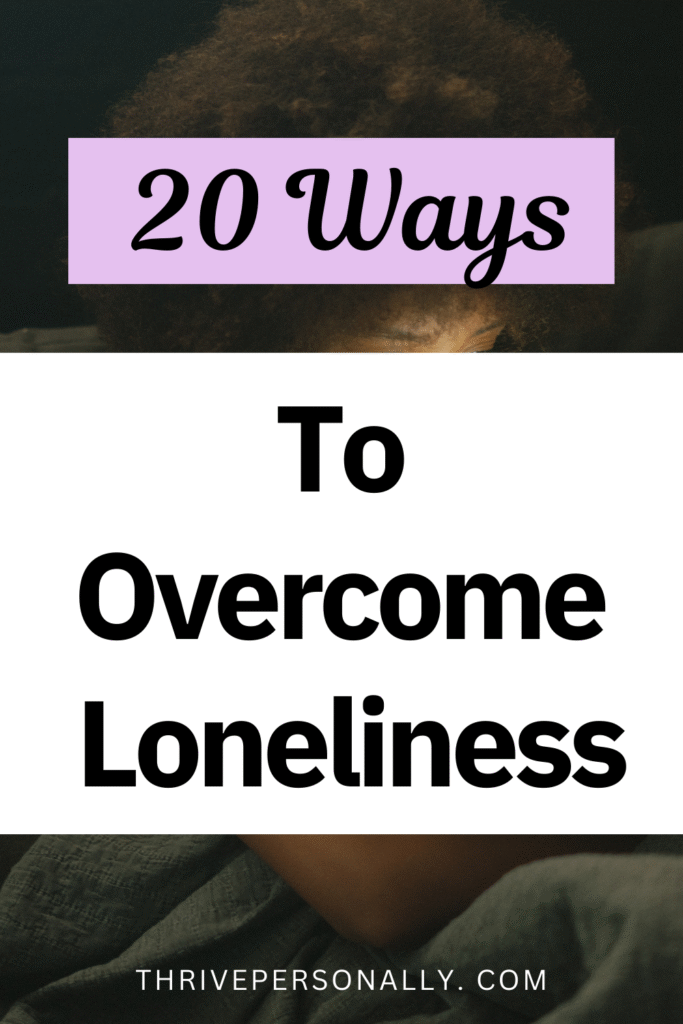It took me a long time to learn that loneliness doesn’t always mean being physically alone. You can be surrounded by people and still feel vulnerable inside. What matters most isn’t the number of people around you, but the depth of your connection—with yourself, with others, and with your environment.
Loneliness isn’t just an emotional experience—it has real physical consequences. Research from the U.S. Surgeon General shows that nearly 50% of Americans report measurable levels of loneliness, which is linked to higher risks of heart disease, depression, and a weakened immune system. The good news? Loneliness is not permanent. It can change, and you can rebuild meaningful connections.
20 Effective Ways to Overcome Loneliness
1. Recognize What You’re Feeling
Admitting you’re lonely is the first step. You might want to hide it or pretend you’re fine, but ignoring it only makes it heavier. Remember, loneliness is a human emotion—not a personal failure. Naming what you feel opens the door to solutions.
Read also: 20 Rules That Will Make You Dangerous
2. Build a Stronger Relationship with Yourself
Sometimes, the deepest loneliness comes from feeling disconnected from yourself. Spend time learning who you are—your values, interests, and what makes you feel alive. This isn’t selfish; it’s the foundation for healthy relationships with others.
3. Reach Out, Even When It Feels Uncomfortable
Make the choice to contact someone—a friend, family member, or even an old acquaintance. A simple chat can remind you that you’re not as alone as your thoughts suggest.
Read also: 20 Exciting Activities to Banish Boredom from Your Life
4. Join a Group with Shared Interests
Being part of a group where you feel you belong is one of the most effective ways to reduce loneliness. It could be a local club, a volunteer group, or an online community. Shared interests naturally lead to connection.
A study in the Journal of Social and Personal Relationships found that participating in group activities significantly reduces loneliness by fostering belonging.
5. Focus on Quality, Not Quantity, of Relationships
You don’t need hundreds of friends—just a few meaningful ones. Invest your energy into deeper conversations and shared experiences with people who truly matter.
6. Learn to Enjoy Time Alone
Not everyone who is alone is lonely. You can train yourself to enjoy solitude by finding activities you love doing alone. This shift makes you less dependent on constant social interaction.
Read also: 25 Fun Things to Do When You’re Home Alone
7. Volunteer Your Time
Helping others creates a powerful sense of belonging. You’ll connect with people who share your values, and research shows that volunteering reduces symptoms of loneliness and depression by increasing purpose (source).
8. Limit Social Media
Social media often fuels loneliness by showing curated highlights of other people’s lives, making you feel left out. Reduce your scrolling time and replace it with real-world activities or self-development.
9. Create a Daily Routine
Unstructured days can make loneliness worse. Build routines that support your well-being—exercise, healthy meals, and hobbies. Structure adds stability and a sense of meaning.
10. Reconnect with Old Friends
Sometimes, a simple message like “I was thinking about you” can open the door to reconnection. A quick call or text can restore familiarity and comfort.
11. Express Yourself Creatively
Art, writing, music, or other creative outlets give your emotions a safe place to live. Creativity also connects you to communities with similar passions.
12. Be Fully Present in Conversations
When talking with others, listen deeply and ask thoughtful questions. Meaningful conversations strengthen bonds far more than surface-level chatter.
13. Practice Gratitude
When loneliness hits, it’s easy to focus on what’s missing. Gratitude shifts your attention to what’s already good. Even small acknowledgments can train your brain to see connection rather than absence.
14. Take Care of Your Health
Your physical health affects your mental state. Staying active, eating well, and sleeping enough boost your mood and energy, making it easier to connect with others.
15. Spend Time in Positive Environments
Your surroundings affect your feelings. Choose warm, welcoming, and uplifting spaces—a park, a cozy café, or a clean, peaceful home.
16. Seek Professional Help When Needed
If loneliness feels overwhelming or long-lasting, a therapist or counselor can help you explore its causes and find coping strategies. This is not weakness—it’s a step toward healing.
17. Learn Something New
Taking a class or learning a skill keeps your mind active and brings you into contact with like-minded people.
18. Practice Self-Compassion
Don’t criticize yourself for feeling lonely. Remind yourself that it’s natural and temporary. Speak to yourself with the kindness you’d offer a friend.
19. Connect with Nature
A walk outdoors can ease feelings of isolation. Nature reminds you that you’re part of a bigger world, helping you feel grounded and connected.
20. Keep Showing Up
Overcoming loneliness is a gradual process. It takes time, consistency, and courage to keep putting yourself in situations where connection is possible. Every step forward brings you closer to belonging.
When you practice these steps, you begin to rebuild your connections—with others and with yourself. Loneliness may visit, but it doesn’t have to stay.
Save the pin for later



